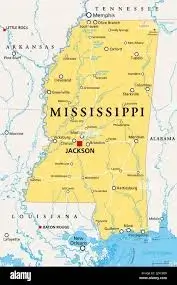
Mississippi, located in the southeastern United States, is bordered by Tennessee to the north, Alabama to the east, the Gulf of Mexico and Louisiana to the south, and Arkansas to the west. The state's landscape is diverse, featuring fertile lowlands in the western half, including the Mississippi Delta region, and rolling hills and forests in the eastern half. The Mississippi River, one of the longest rivers in North America, forms the western boundary of the state.
Historically, Mississippi has a complex and often troubled past. It was originally inhabited by various indigenous peoples, including the Chickasaw, Choctaw, and Natchez tribes. European exploration and colonization began in the 16th century, with the French establishing the first permanent settlement at Ocean Springs in 1699.
The region became part of the United States through the Louisiana Purchase in 1803, and Mississippi was later admitted to the Union as the 20th state on December 10, 1817.
Mississippi played a significant role in the Civil War, with many battles fought on its soil. The state was a major center of cotton plantation agriculture reliant on enslaved labor, and after the Civil War, it became a focal point of the Civil Rights Movement due to its history of segregation and racial discrimination.
Today, Mississippi is known for its rich cultural heritage, including blues music, literature, and culinary traditions. It also faces challenges such as poverty, education, and healthcare disparities.